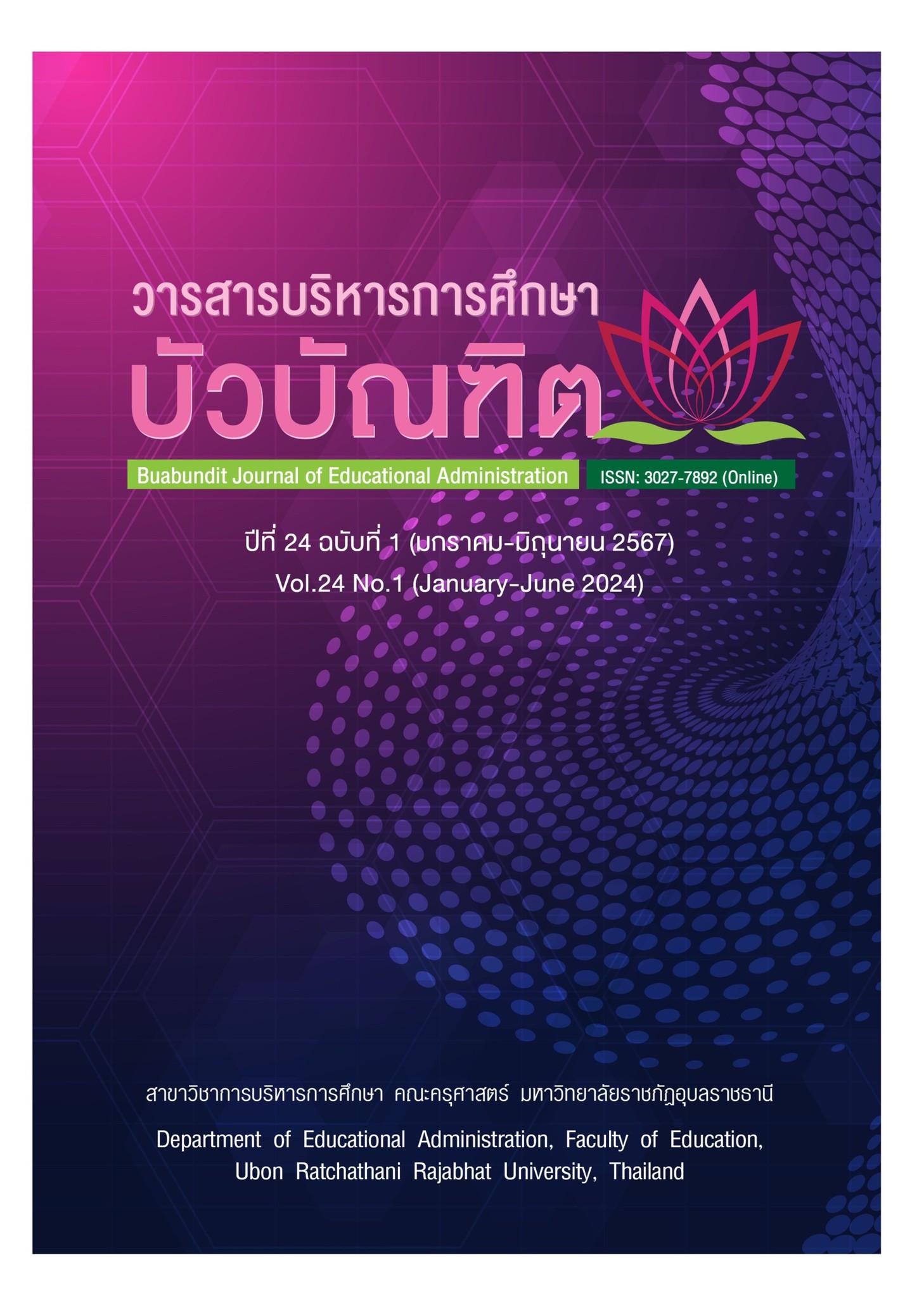พลวัตการแลกเปลี่ยนความเห็นของที่ปรึกษาการวิจัยเชิงปฏิบัติการในชั้นเรียน
Main Article Content
บทคัดย่อ
ภาพรวมการวิจัยด้านการศึกษาในประเทศไทย ยังขาดการสำรวจการวิจัยเชิงปฏิบัติการในห้องเรียนภาษาอังกฤษ อีกทั้งประเด็นการให้คำปรึกษาเพื่อการพัฒนาวิชาชีพยังไม่มีการศึกษามากนัก การศึกษาครั้งนี้มีจุดมุ่งหมายเพื่อศึกษากระบวนการให้คำปรึกษาสำหรับการวิจัยเชิงปฏิบัติการเชิงสำรวจ โดยผู้เขียนมีส่วนร่วมในการให้คำปรึกษาเป็นเวลาหนึ่งปี ร่วมแบ่งปันประสบการณ์ที่ได้รับการเสริมสร้างคุณค่าจากการสนทนากับเพื่อนร่วมวิชาชีพในการสอนภาษาอังกฤษ แนวทางการทำงานร่วมกันนี้จะทำให้เห็นถึงพลวัตและประสิทธิผลของการให้คำปรึกษาในบริบทของการวิจัยเชิงปฏิบัติการ ด้วยการบันทึกประสบการณ์ของการเป็นผู้ให้คำปรึกษาในการวิจัยเชิงปฏิบัติการเชิงสำรวจ การศึกษานี้ให้ความเข้าใจอย่างละเอียดถี่ถ้วนเกี่ยวกับกระบวนการให้คำปรึกษาและผลกระทบที่มีต่อผู้ให้คำปรึกษาและผู้รับคำปรึกษา ผู้เขียนได้สำรวจความซับซ้อนของการให้คำปรึกษาผ่านการโต้ตอบและการฝึกไตร่ตรอง โดยเสนอคำแนะนำเชิงปฏิบัติและข้อมูลเชิงลึกทางทฤษฎีสำหรับนักการศึกษาและนักวิจัย การศึกษาครั้งนี้มีส่วนช่วยในการสร้างวาทกรรมอย่างต่อเนื่องเกี่ยวกับการให้คำปรึกษาในการวิจัยทางการศึกษา โดยชี้แจงความท้าทาย ความสำเร็จ และบทเรียนที่ได้รับจากประสบการณ์ นอกจากนี้ผลการศึกษายังเน้นย้ำถึงความสำคัญของความร่วมมือและความสัมพันธ์ที่สนับสนุนในการส่งเสริมการเติบโตทางวิชาชีพและการพัฒนาแนวปฏิบัติด้านการศึกษา โดยรวมแล้วการศึกษานี้ทำหน้าที่เป็นทรัพยากรที่มีคุณค่าสำหรับนักการศึกษา นักวิจัย และผู้กำหนดนโยบายที่มีเป้าหมายที่จะยกระดับแนวทางปฏิบัติในการให้คำปรึกษาและส่งเสริมการพัฒนาวิชาชีพที่มีความหมายในบริบททางการศึกษา
Downloads
Article Details
เอกสารอ้างอิง
Akcan, S., Büyükgümüş, S., Mor, K., & Çoban, M. (2019). Exploratory action research practices in a language teacher education programme. Energizing Teacher Research, 29.
Asanok, M., & Chookhampaeng, C. (2016). Coaching and Mentoring Model Based on Teachers' Professional Development for Enhancing Their Teaching Competency in Schools (Thailand) Using Video Tape. Educational Research and Reviews, 11(4), 134-140.
Aspfors, J., & Fransson, G. (2015). Research on mentor education for mentors of newly qualified teachers: A qualitative meta-synthesis. Teaching and teacher education, 48, 75-86.
Bakhtin, M. (1984). Problems of Dostoevsky’s Poetics. Translated by W. Booth. Manchester:Manchester University Press.
Berger, J. G., Boles, K. C., & Troen, V. (2005). Teacher research and school change: Paradoxes, problems, and possibilities. Teaching and Teacher Education, 21(1), 93e105.
Ballantyne, R., & Mylonas, A. (2001). Improving student learning during'remote'school-based teaching experience using flexible delivery of teacher mentor and student preparation programmes. Asia-Pacific Journal of Teacher Education, 29(3), 263-273.
British Council. (n.d.). Exploratory action research Thailand. Retrieved on 25 March 2024 from https://www.britishcouncil.or.th/en/exploratory-action-research-thailand
Burns, A. (2009). Action research in second language teacher education. The Cambridge guide to second language teacher education, 289-297.
Freire, P. 1998. Pedagogy of Hope: Reliving Pedagogy of the Oppressed. New York: Continuum.
Hudson, P. (2014). Feedback consistencies and inconsistencies: Eight mentors’ observations on one preservice teacher’s lesson. European Journal of Teacher Education, 37(1), 63-73.
Loo, D. B., and E. Ching. 2018. “Same Course, Different Teaching? Exploring ‘Collaborative Teaching’ of Academic Writing at Higher Education through Reciprocal Journaling.” Journal of Studies in the English Language 13 (2): 67–118.
Loo, D. B., Trakulkasemsuk, W., & Zilli, P. J. (2017). Examining narratives of conflict and agency: Insights into non-local English teacher identity. Journal of Asia TEFL, 14(2), 292.
Lytle, S., & Cochran-Smith, M. (1992). Teacher research as a way of knowing. Harvard Educational Review, 62(4), 447e475.
Rainey, I. (2000). Action research and the English as a foreign language practitioner: Time to take stock. Educational Action Research, 8(1), 65-91.
Stremmel, A. J., J. Burns, C. Nganga, and K. Bertolini. 2015. “Countering the Essentialized Discourse of Teacher Education.” Journal of Early Childhood Teacher Education 36 (2): 156–174.
Smith, R. (2015). Exploratory action research as workplan: why, what and where from. Teacher-researchers in action, 37-45.
Sundli, L. (2007). Mentoring—A new mantra for education?. Teaching and teacher education, 23(2), 201-214.
Thipatdee, G., Chaichana, N., & Kamsanor, A. (2019). Teacher Development through Coaching and Mentoring Integrated with the 21st Century Instructional Strategies. International Education Studies, 12(11), 8-17.
Wennergren, A.-C. (2016). Teachers as Learners–with A Little Help from A Critical Friend. Educational Action Research, 24(2), 260–279.


